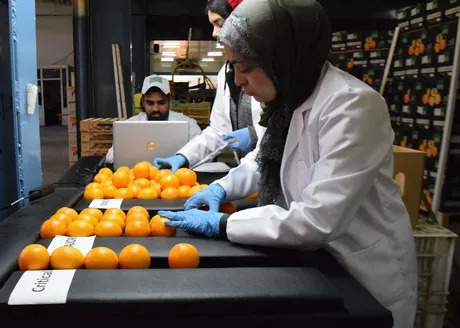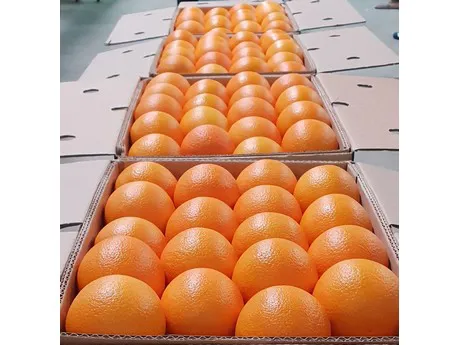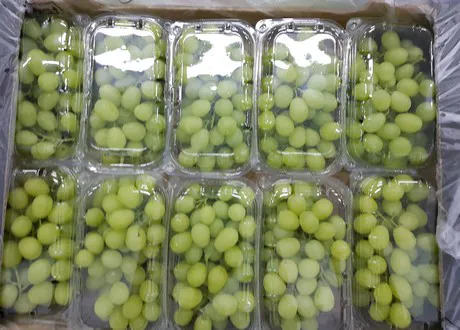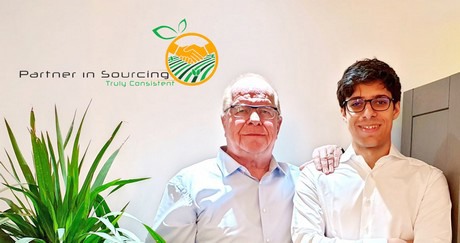With a short break of seven years, Dutch entrepreneur Hans Korsten (66) has been living in Egypt for the past thirty years. He doesn’t expect to leave anytime soon and hopes people will still be able to find him in Cairo in another thirty years’ time.
In all this time, Korsten has played a number of roles for different kinds of companies in both Egypt and European countries. “However, in recent years, the market has been clearly subject to changes. During these thirty years, Egypt has matured into a respectable player in the fresh produce market. As an example, cooling cells were non-existent in the nineties, but thanks to all this growth, there is now room to improve in the export of fresh fruit and vegetables.”

It performs a meticulous check during the production
While Korsten will continue his work as an agent (sourcing, mediation, following up and informing) without question, he’s noticed a huge rise in the demand for structural quality-systems enforced by a neutral party. A company inspecting the quality of its own produce will always be slightly biased, says Korsten. “Too often I hear that while the market is convinced of Egypt’s huge quality potential, it simply lacks consistency. My customers want to be able to count on me to supply them the same quality every week, and that is often lacking. It is the complaint I hear the most often from customers,” says Hans.
Strikingly, the Dutch KCB (an independent governing body) gave Egypt a warning about its citrus in its 2018 annual report. “Skin damage is a common problem. Imports from Egypt are also burdened by this, with batches that are clearly class II, which are marketed as Class I. "Specifications, specifications and further specifications," Hans continues, “That is what it is all about. Within the Class I there is an acceptable spectrum, and for the Class II this spectrum is even wider. So what exactly do producers and buyers want? How do they want to position themselves? With which specifications do they want to approach the market?”

With which specifications do they want to approach the market?
At almost all packing stations in Egypt (and in many other countries) the performance is determined by a warehouse manager who is fully ‘production-oriented’. “Achieving the greatest possible efficiency in terms of production quantity and minimizing waste are central, and no matter how you look at it, in most cases, this is done at the expense of being able to supply a consistent quality. So there is a conflict between efficiency and consistency," Korsten explains. “This means a pesky guy in quality control could throw a monkey wrench in his statistics. This is often not noticed simply because there are no frequent quality controls, and the warehouse manager has to account to the owner for any excessive amount of waste produce."
Therefore, by enforcing the quality service of Partner in Sourcing (PinS) and thereby transferring quality controls to an independent party, an exporter/importer will take an important step towards that important consistency. “PinS does not check the end product in storage, but it performs a meticulous check during the production, processing and packaging processes, eventually registering the final product with photos, making sure it meets the given specifications. Last, but not least, PinS orders production managers to take corrective action when a product does not meet the requirements," says Korsten.

The grape season is starting soon
But the frequency in which Partner in Sourcing will check the produce isn’t the only way to guarantee customer satisfaction; transparency is also paramount, so the registrations, including the sample results, take place online. “By having all the information available to all our clients online, they can check in at any given point to see the statistics of the past hour, day or week. And with every entry we take pictures. A huge advantage of this system is the possibility of corrective action, because this isn’t possible with any other quality check later in the chain. By that time it's just too late. The system thus offers an additional advantage for direct deliveries from warehouses in Egypt to direct destinations. A company such as the recently founded Chainn, which decided to follow this new trend, is a happy user of the PinS service and has no sleepless nights over quality issues. And that applies to anyone embracing PinS.” Korsten says.

"We are ready!"
Together with his son Bram Korsten (24), Hans has delivered a good volume so far. With clients in Egypt and Europe, but also in South Africa, the Korstens and their team of inspectors are working hard to make PinS more relevant. They are both highly convinced of the need for PinS and are going to give it a boost. “The grape season is coming and in the summer a lot of work is being devoted to a website and other promotional activities. We’re ready for the grapes next month, and the 2019-2020 season with its wide range of products. Be it beans, strawberries, onions or countless of other products, we are most definitely ready for it.” Korsten concludes.
For more information:
Hans Korsten
Partner in Sourcing
Tel: +20 10111 996 94
Tel: +31 6 124 156 00
Email: hkorsten@partnerinsourcing.com
www.partnerinsourcing.com
